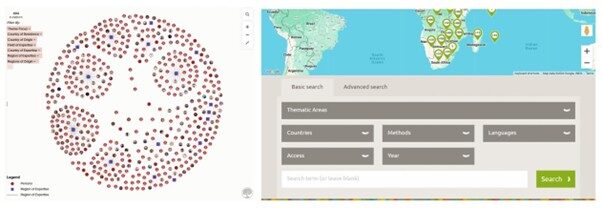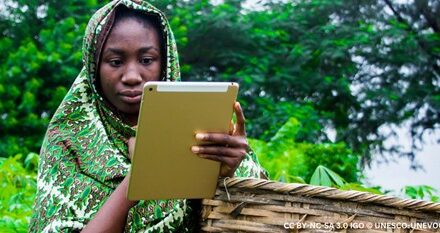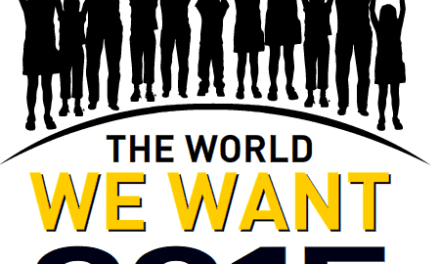Written by Dr Bukola Oyinloye, University of York.
This blog examines the implications of invisibility in education and development research drawing on insights from a scoping exercise commissioned by UKFIET to explore the visibility, research opportunities and intellectual influence of education researchers in the global South.
Who is most visible?
A 2019 analysis of references for a series of Education For All Global Monitoring Reports (GMRs) published between 2002 and 2015 identified an elite group of 89 researchers, primarily based in global North institutions, connected with one another not only through the World Bank, UNESCO and GMR publications, but also through academic and ‘academic-like’ publications. This group of researchers had each been referenced at least 10 times across the period of the study. Among the 78 members of this group whose educational background was accessible, 68 (or 87%) received their highest degrees from institutions in the US or the UK, while only two received theirs from institutions in the global South.
Amongst the 89, of whom more than 75% were male, only five were employed at an organisation located in the global South at the time of the study, with more than 65% working for organisations located either in the US or in the UK. A superelite group of 39 highly-influential authors were further identified, based not only on the degree of their outputs with frequently-cited organisations in the GMRs, but also on their co-authorship with a wide range of authors. Amongst the superelite, only one was a Black African, albeit a male working in a global North academic institution, and whose highest degree was completed in the global North. No Africa-based woman featured amongst the 39, neither is it clear whether one was amongst the 89. While the study offers no clues as to authors’ methodological approaches, a scan of the superelite suggests it is a primarily quantitative group. As Schweisfurth and colleagues’ analysis of epistemic communities suggests, such work is often funded by aid agencies and national governments, bequeathing its authors with significant and, arguably, disproportionate influence over global and national education policies and practice. Unlike many highly skilled researchers in the contexts they ‘author’, these authors thus have the privilege of intellectual authority – the ability to make and have influence through intellectual ‘truth claims’.
Who is least visible?
A few clues about those less visible are offered in the aforementioned analysis: women; non-residents of the US, UK or the global North; those whose highest degrees were not completed in the US or UK; those of African origin; those who cannot (or do not) publish in English; those who adopt a more qualitative orientation; etc. To generate further insight about members of this least visible group, with a view to imagining possibilities for more equitable knowledge production by its members, UKFIET’s interests around knowledge generation in education and development led to the commissioning in 2024 of a small, qualitative scoping exercise to explore the visibility, opportunities and influence of Southern researchers in the field. Inspired by efforts of emerging databases of Southern-based researchers, the exercise sought to explore the extent to which such databases:
- created visibility
- deepened opportunities
- and helped generate influence for Southern researchers.
The exercise also considered how UKFIET members may use the databases to source Southern researchers and/or research organisations. Visibility was defined as the (basic) opportunity to be included on (public) platforms, databases or authorship of outputs related to a terminal degree (i.e., Master’s or PhD). Substantive (or deeper) opportunities were construed as involvement in research beyond a terminal degree, e.g., through intellectual contribution to or leadership of the design, conduct, analysis, reporting and dissemination of ‘new’ or externally-funded research and the authorship recognition engendered by such involvement. Influence was conceived as evidence of contributions to education and development policy, practice or field, particularly at the global level.
Staff from two active databases of global South researchers were purposively identified, and a snowball approach was adopted to identify researchers from low- and middle-income countries (LMICs). Participants from organisations employing researchers in LMICs were identified from UKFIET’s network. Eleven participants were interviewed: from the African Education Research Database (three) and #TheSouthAlsoKnows (one) databases; two staff from UKFIET member organisations which conduct research; and five African and Africa-based researchers (three early career, one mid-level and one senior). Qualitative coding was used to analyse interview notes. Given most participants were African researchers or worked on issues related to Africa, the exercise ultimately narrowed its scope to Africa.
Why are they less visible?
The findings suggest that database staff created visibility through researcher databases and visual mapping and other modes such as digital media, in-person convenings, virtual fora, and member engagement. Opportunities were facilitated through member-engagement events and connections with others who held or could connect members with deeper opportunities. However, there was limited evidence of intellectual influence. Database staff highlighted various constraints to visibility, including technical and operational challenges with databases; limitations in the ability to provide support and other resources to researchers and members; various challenges identified by researchers themselves; difficulties in enabling global influence; and funding.
African researchers themselves highlighted diverse constraints to visibility, opportunities and influence, although these were more profound for those earlier in their research careers. Challenges included technical writing limitations; institutional constraints through workload, lack of access to academic databases, payment for institutional ethics applications (and delays in the processes) and bureaucracy; and financial constraints through payments to publish (e.g., in predatory journals) and funding to carry out original research, i.e., research for or beyond a terminal degree. The mid- and senior academic experienced these constraints to a lower extent given the majority of their outputs were co-authored with Northern Principal Investigators of externally-funded research projects conducted in their respective countries. The senior academic was a highly-published male academic with extensive experience collaborating with elite global North partners on primarily quantitative research. The mid-level academic also had considerable experience collaborating with global North partners, but was female and employed primarily qualitative approaches. Notably, while both now wielded greater intellectual leadership in their collaborations, the mid-level academic highlighted that such collaborations often required Southern-based collaborators to shoulder the ‘donkey’ work.
Evidently, deeper opportunities were more accessible to the more senior academics. As such, examples of influence were only provided by them: for the mid-level, on practice, and for the senior, on national policy and practice. However, there was limited evidence of global influence on policy and practice or intellectual influence in the field. Neither the mid- nor the senior-level academic was among the elite 89, though it is possible that they may be among the wider non-elite cohort of authors referenced fewer than 10 times each.
During interviews, member organisations highlighted the coloniality of financialised assumptions about differences in the values of international researchers vis-à-vis their national counterparts, and donor preferences Northern or Northern-based researchers. Acknowledging global South researchers’ wealth of knowledge, the members highlighted capacity needs particularly around non-technical issues such as budgeting and research project management. Substantive opportunities were typically provided through engagement of researchers in the conception, conduct, analysis and reporting of research, along with attributed authorship and organisations’ use of research outputs in advocacy initiatives. Influence was highlighted through contribution to global policies, while there were also reports of influence on national policy and practice through connectedness with official education entities and research dissemination activities.
These findings highlight:
1) current efforts to amplify visibility through online platforms (e.g., databases) and events, as well as through creation of opportunities for connections between researchers, and between researchers and opportunity holders
2) the structural and institutional constraints faced by African (and by extension, Southern) researchers, particularly in the pre-publication stage
3) the limited global policy and intellectual influence of African (particularly Africa-based) researchers due to the limited substantive opportunities, particularly in terms of intellectual leadership
4) the importance of intersectionality and epistemic orientation in understanding intellectual authority.
The underrepresentation of African scholars in global scholarly research outputs remains a persistent issue. As the findings suggest, this underrepresentation is driven not by individual technical limitations but by factors such as colonial legacies (e.g., Whiteness and knowledge production, institutional prestige, etc.), institutional constraints in the global South, and intersectionality. Importantly, underrepresentation not only limits the visibility of Southern-based African (and by extension, global South) researchers’ knowledges, it also maintains an epistemic coloniality which privileges Euro-American knowers and forms of knowing.
Recommendations
Heeding the call of Yvette Hutchinson, former UKFIET Executive Committee Chair, to explore “how we might engage with donors and use our power to promote African researchers as leads and PIs in research projects”, and in line with others working on Southern researchers’ needs, the following recommendations are proposed:
- In addition to referrals of Southern researchers, develop or adopt principles under which these researchers should be engaged to reproduce inequitable research partnership practices, with particular attention to the needs of women and early career researchers.
- (Continue to) Advocate for globally-standardised rates for researchers with similar experience levels.
- Foster connections between Southern and Northern researchers to facilitate knowledge and skills exchange, research collaboration and mentorship.
- Provide opportunities for collaborative writing (within South and between North and South).
- Support writing retreats or fellowships to provide researchers with dedicated writing time.
- Provide academic mentorship to support manuscripts development and revision.
- Widen opportunities for researchers to engage with other critical stakeholders in the education ecosystem, e.g., decision-makers, practitioners, activists, etc.
- Support Southern researchers in identifying predatory journals.
- (Continue to) Deepen advocacy for unrestricted donor and national research funding.
- Develop mechanisms for research funding schemes to support Southern researchers’ intellectual leadership and authorship recognition.
- Valorise Southern knowledges and diverse methodological approaches.






